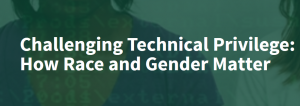 Lately, you may have noticed attention to the plummeting decline of women entering computer science since the 1980s. Perhaps you heard the story on National Public Radio’s Morning Edition. Maybe you are tired of people asking you if working in tech is like HBO’s Silicon Valley or The Big Bang Theory. “Girls don’t do math” is a refrain many talented women can speak to.
Lately, you may have noticed attention to the plummeting decline of women entering computer science since the 1980s. Perhaps you heard the story on National Public Radio’s Morning Edition. Maybe you are tired of people asking you if working in tech is like HBO’s Silicon Valley or The Big Bang Theory. “Girls don’t do math” is a refrain many talented women can speak to.
This is only half of the story.
The other half is the poorly prepared white or Asian male given the benefit of the doubt – who is given encouragement, mentoring, and offered apprentice with others of the same complexion and sex until, with enough practice, they amount to something. I’m one of those.
Imagine a world where those born in the first six months of the year are systematically granted more opportunities than those born later in the year. Reinforce this advantage with extra training, repeated selection, and training at higher levels. You have the world of professional hockey.
Social scientists call such favoritism “privilege” – as in White Privilege.
I’m writing about a different type of privilege: Technical Privilege. This is the advantage given to certain groups pursuing technical fields, such as computer science and physics, whose repeated application helps to generate real advantage. For a popular account, I recommend Malcolm Gladwell’s book Outliers.
Many of us were inspired by an article in Slate magazine written by MIT computer science graduate Philip Guo ’05. Guo described how being an Asian male gave him unearned privilege that helped him compensate for deficiencies. As he said, “Nobody every says you only got into MIT because you’re an Asian man.” He spoke up about micro-inequities, stereotype threat, and silent technical privilege.
Technical Privilege means that when you look the part – like Philip or me – then everyone assumes you are going to succeed and no one questions whether you belong. Privilege is silent. But it is not invisible. Sometimes you have to look at it like a photographic negative, to see the light areas that become dark when made into a print. For me, privilege is my not having to think about acting like a woman to get ahead in my profession (as opposed to a woman having to act like a man), and my not having to fear being mistaken as a trespasser on campus unlike many of my black faculty colleagues. Privilege is as much about not having to step back in line, as it is about being moved up in line.
Philip Guo’s story resonated with many of us at MIT, so we organized a symposium to bring visibility to the topic. This was an interdisciplinary effort involving Women’s and Gender Studies, the Office of Minority Education, the Institute Community and Equity Office, and Computer Science. It was well attended, with more than 200 people, who learned how bias and other factors lead to the marginalization and underrepresentation of women and minorities in STEM fields. I was the moderator and there were five panelists.
You can watch the symposium on video. If you have only 25 minutes, watch the remarks by MIT students Jean Yang and Tami Forrester on the panel starting at 33:50. If you have more time, watch the whole video. The insights provided by Intel computer scientist Gabriela Gonzalez, social scientist Jane Stout, and policy expert Donna Milgram, are important to hear.
Almost a month after the symposium, I continue to feel its impact. I hope others will consider this issue, too, because it offers critical lessons on how we can develop the full talent pool available in technical fields. MIT faculty members need to learn these lessons. Please watch the video and tell me what you think.
